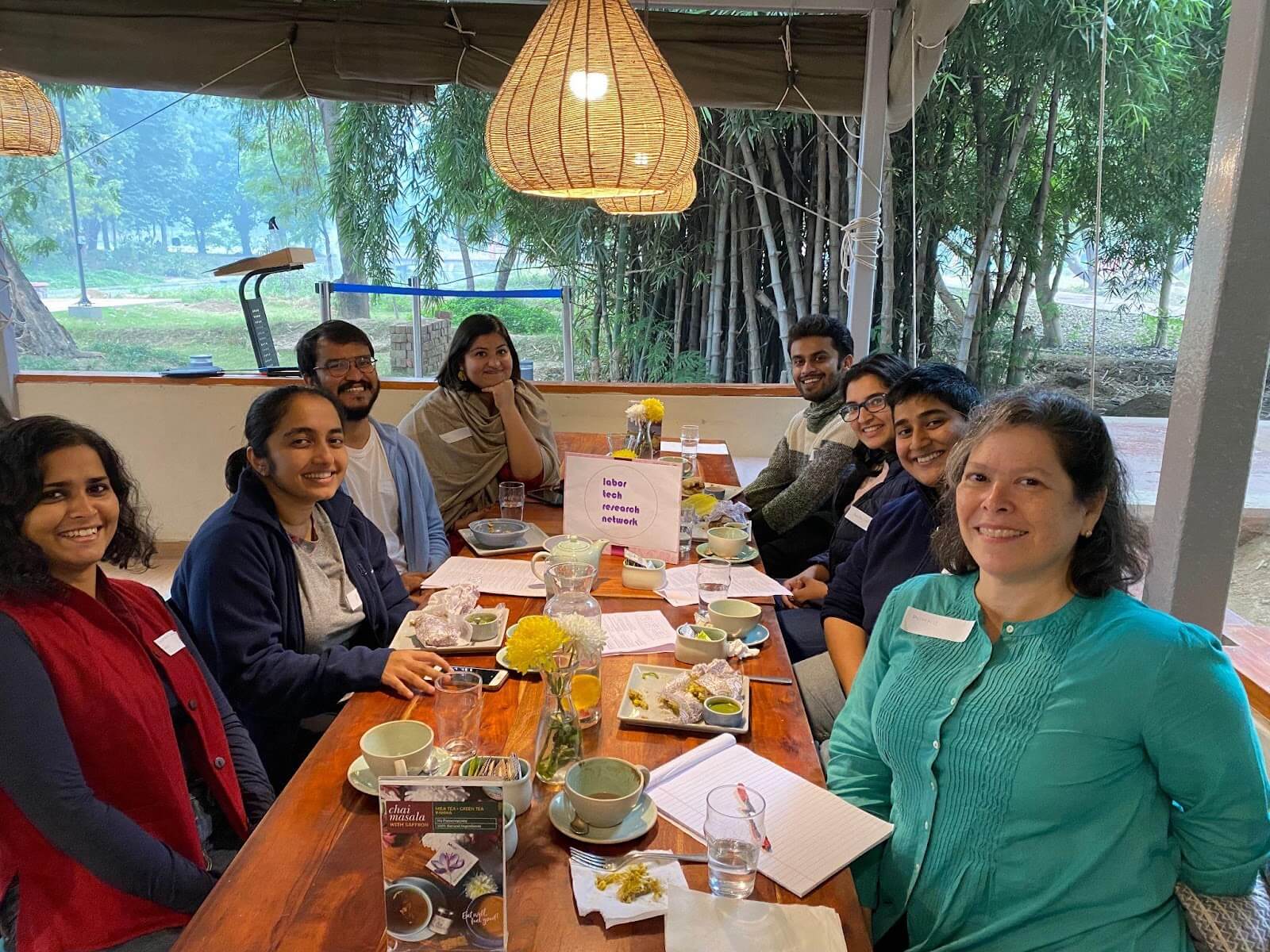Labor Tech Research Network: A Community Dedicated to Scholarship and Activism
Karina Rider, Ope Akanbi & Winifred R. PosterDecember 5, 2022 | Projects
http://labortechresearchnetwork.org/
Labor Tech Research Network (LTRN) is a community of people dedicated to analyzing issues of labor and technology from an anti-racist, feminist, and transnational perspective. We have close to 400 members, including researchers, tech workers, policy makers, activists and union organizers affiliated with institutions in over 35 countries. In this blog post, we provide a history of LTRN’s formation and outline the infrastructural work currently being done to build a home for critical research on labor and technology.
Background and Vision: A Focus on Labor
In 2013, we started as a reading group in the Center for Social Computing at UC Irvine. Meeting in Kavita Philip’s office, a few of us wanted to highlight labor in wider discussions of social computing, and to ground it in feminist, anti-racist, and decolonial principles. We began by reading Susan Leigh Star and Anselm Strauss’ “Ecologies of Visible and Invisible Work,” Lucy Suchman’s “Making Work Visible,” and Kalyan Sanyal’s Rethinking Capitalist Development. Sometimes we just wanted to talk about things on our minds or things happening at the moment, like abolishing peer review and how to do fieldwork in a pandemic. Moving online and inviting our colleagues one-by-one through word of mouth, this group grew into the Labor Tech Research Network (LTRN), which was formally registered as a 501(c)3 nonprofit in 2020. We set up a Board of Directors and started to institutionalize our activities.

LTRN’s Officers and Board Members, 2022. 1st Row, L to R: Winifred R. Poster, Yovanna Pineda, Stephanie B. Jordan, Julie Chen. 2nd Row, L to R: Sareeta Amrute, Aneesh Aneesh, Ifeoma Ajunwa. 3rd Row: L to R: Rafael Grohmann, Miriyam Aouragh, Geeta Patel, Snigdha Kumar.
At LTRN, we have sought to create a different kind of environment, one that emphasizes flexibility and spontaneity; non-hierarchical and collaborative relations; and a refusal to incorporate all the toxic elements of mainstream organizations. Everybody gets to participate and have a voice. Conversations are positive and constructive.
We’ve been able to keep momentum over the years because of the commitment of a core group of people to keep up the discussion, despite all the problems of time, distance, and lack of critical mass (thank you Luke Stark and Michael Palm for sticking with us in those early days). We learned by trial and error the best compromise time for varying global time zones. Still, so many people have stayed up late, even past midnight (thank you Rolien Hoyng, Jack Qiu, Itty Abraham, and Julie Chen) or got up early (thank you Lilly Irani and Steph Jordan).
Activities: Building Infrastructure
We are currently focused on building the infrastructure required to sustain and grow our transnational network. We aim to facilitate connections between members; to support collaborations and knowledge sharing amongst academics, practitioners, workers, and activists; and to increase the dissemination of our members’ research, helping them to contribute to crucial research and policy debates. Here are a few examples of our working groups dedicated to this infrastructure-building work:
Speaker Series. The early reading group meetings of LTRN have since blossomed into our Speaker Series, a biweekly event featuring speakers working on a range of topics. In 2022 alone, we have hosted 18 speaker series events on a range of topics, including the history of telehealth; inequality and political action in Silicon Valley high-tech firms; The Surveillance Technology Oversight Project; university campus labor organizing; critical caste and technology studies; luddism; and histories of disability and automation. Our selection of speakers reflects our commitment to transnationalism; this year, our speakers were affiliated with 11 different countries.
Communications & Resources. We have built out our internal communications infrastructure by developing a social media presence, and generating a bi-weekly Digest of updates on members’ talks and publications, as well as labor-related news (e.g., strikes). Our Resources team is building and maintaining a freely available archive of labor and technology materials. This includes a 10-year archive of publications by presenters in our Speaker Series; a Zotero library of our members’ publications; a collection of course syllabi; and links to videos, documentaries, podcasts, and daily reads on issues related to labor and technology.
Social Justice. LTRN promotes scholar-activists and provides a home for critical scholarship. We aim to advocate for researchers of labor and technology who are living under repressive regimes and are unable to speak out on particular topics so we can amplify their voices. Part of this work also includes writing letters of solidarity for technologists facing scrutiny for their work advancing social justice. As part of our archival work, we are also building a repository of current organizations advocating for workers’ rights and resources for learning and teaching about issues related to labor, technology, and justice.
Impact: Crafting a Field
The impacts of these events are already being seen across the scholarly community. Our Speaker Series panel on “Refusal” was published in transcript form in the journal Refuse. People are starting to cite us in their acknowledgements (thank you to Alex Rosenblat for doing so in Uberland, and Mary Gray and Siddharth Suri in Ghost Work). Aiming to have a long-term influence, we have worked to build the following institutions and networks that establish labor and technology as a field of study:
Book Series. In 2020, LTRN launched a book series with MIT Press on labor and technology. The first four books are scheduled to be published in 2023. These include LTRN Director Winifred Poster’s Multi-Surveillances: Transnational Digital Agencies in the Outsourced Services of Indian Call Centers; Madison Van Oort’s Worn Out: How Retailers Surveil and Exploit Workers in the Digital Age and How Workers are Fighting Back; Sofya Aptekar’s Green Card Soldier: Between Model Immigrant and Security Threat; and Margaret Jack’s Media Ruins: Cambodian Postwar Media Reconstruction and the Geopolitics of Technology.
Awards. Our inaugural Book Award and Graduate Student Paper Award recognize outstanding works on labor and technology, that align with our mission as an anti-racist, feminist, and transnational organization. We plan to announce the first winners of the award, as well as the honorable mentions, at our launch event at 4S (see postscript below).
Partnerships. We are strengthening networks by collaborating with other organizations. This year, we have started formal partnerships with Fairwork and the Transnational Institute. We helped to sponsor the first virtual conference of the Center for Applied Transgender Studies. As part of our mentoring work, we partnered with the Digital Economy and Labor undergraduate group at Cornell University.
Future: Transnational Hubs
Our plan for the future is to extend our presence internationally by setting up transnational hubs. We have established a South Asia Hub through a meetup in Delhi, 2021; an East Asia Hub through a special session on Global Asia at our Speaker Series this year; and a Latin America Hub through a set of events at the upcoming 4S meeting in Mexico. Our goal is eventually to decentralize and coordinate through these networked hubs.

LaborTech members at a Delhi meetup in 2021.
(Kimberly Fernandes, Abhishek S., Aayush Rathi, Aditi Surie, Ambika Tandon, Bhumika Chauhan, Snigdha Kumar, and Winnie Poster)
Postscript: Launch at 4S
We invite the readers of Backchannels to attend our official launch at 4S in Cholula, México, this December. With a day of events on Friday, December 9th, we will introduce our current activities, members, and mission to the conference and our community, and sponsor an unconference discussion of keywords in labor and technology. For more information, please visit our website. LTRN is run by volunteers. If you would like to help fund our activities, please consider supporting us.
Karina Rider is a Postdoctoral Researcher with the Social Media Collective at Microsoft Research. As an ethnographer of technology critique, Karina studies how struggles for justice unfold in datafied societies, with a focus on labor, culture, and race. They are currently writing a book for MIT Press’ Labor and Technology Series about the vocational politics of Tech for Good initiatives.
Ope Akanbi is an Assistant Professor in the Creative School at Toronto Metropolitan University. She is cross appointed to the Joint Graduate Program in Communication and Culture offered in partnership with York University. Her research areas are privacy, media regulation, labor and technology and the political economy of media. Her publications include articles in Media Culture and Society, the International Journal of Communication and Yale Law Journal Forum.
Winifred R. Poster is director of Labor Tech Research Network, and teaches in International Affairs at Washington University, St. Louis. Her interests are in feminist theory, digital globalization, service labor, and technologies of activism. With a regional focus on South Asia, she has been following outsourcing of US high tech, data processing, and call center work to India since the mid-1990s. Her books are Borders in Service with Kiran Mirchandani (Toronto, 2016), Invisible Labor with Marion Crain and Miriam Cherry (UC Press, 2016), and Multi-surveillance (MIT Press, forthcoming). Recent special issues are “Scams, Fakes and Frauds” for New Media & Society, and “Digitizing Borders, Cities, and Landscapes” for Information & Culture.
Published: 12/05/2022
